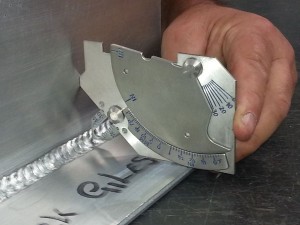Why Choose Expert Welding Inspection Madison for Your Jobs
Why Choose Expert Welding Inspection Madison for Your Jobs
Blog Article
The Relevance of Thorough Welding Assessment in Industrial Applications
In the realm of industrial applications, the value of meticulous welding inspection can not be overemphasized. It plays a necessary function in ensuring the architectural stability and longevity of bonded components. Advanced non-destructive screening techniques enable the very early detection of possible problems, such as cracks and insufficient combination, which, if left unattended, can result in tragic failures. In addition, adherence to stringent market requirements not just guarantees top quality but likewise constructs client self-confidence. As we check out the complex benefits of thorough welding evaluations, one must consider the broader ramifications on safety, integrity, and cost-effectiveness in commercial operations.
Enhancing Structural Stability
When it comes to welding evaluation in industrial applications, improving architectural honesty is paramount. The key goal of welding inspection is to make certain that the welds are qualified of birthing the anticipated anxieties and lots they will certainly experience in solution.
The value of maintaining structural stability in bonded frameworks can not be overemphasized. Badly implemented welds can result in tragic failings, leading to costly repair services, downtime, and also endangerment of human lives. Assessors play a critical function in the lifecycle of commercial components, offering guarantee that the welding process provides the desired toughness and sturdiness.
Additionally, advanced innovations, such as phased selection ultrasonic screening and digital radiography, deal enhanced abilities in detecting potential weaknesses, permitting corrective steps before problems intensify. By focusing on the honesty of welds via meticulous assessment, markets can make certain operational efficiency and expand the long life of their framework.
Recognizing Welding Flaws
Determining welding problems is an essential aspect of making certain the safety and reliability of bonded frameworks. These flaws can endanger the honesty of the whole assembly and, if left unaddressed, may lead to catastrophic failings. Usual welding flaws consist of porosity, splits, incomplete combination, and undercutting. Each of these defects emerges from certain causes, such as incorrect welding techniques, contamination, or poor warm control.
Proficient examiners use both visual examination and progressed non-destructive screening (NDT) techniques, such as ultrasonic or radiographic testing, to identify these problems. The prompt identification and correction of welding problems are essential to keep the structural honesty and longevity of commercial parts.
Guaranteeing Conformity Criteria
Compliance with established requirements, such as those offered by the American Welding Society (AWS) and the International Organization for Standardization (ISO), guarantees that welds satisfy minimum safety and quality requirements. These standards encompass a vast range of criteria, including product requirements, welding treatments, and credentials of welders.
Regular audits and inspections are necessary in validating compliance. Inspectors should have a detailed understanding of the appropriate standards and be experienced at using numerous non-destructive testing (NDT) methods to examine weld quality. By making sure that welding practices line up with conformity standards, business mitigate the danger of non-conformity, which can bring about legal obligations and safety and security risks.
Additionally, maintaining compliance not just about his safeguards architectural honesty but likewise enhances a firm's reputation in the market. Clients and stakeholders are more probable to trust firms that constantly show a commitment to quality and security with extensive conformity. Therefore, ensuring compliance requirements is a vital element in the successful execution of welding in commercial applications.
Minimizing Upkeep Prices

The application of innovative non-destructive screening (NDT) methods, including ultrasonic, radiographic, and magnetic bit examinations, improves the capacity to detect subsurface defects without jeopardizing the structural stability of elements. By using these techniques, industries can considerably prolong the life span of their equipment, decreasing downtime and the linked economic worry of upkeep tasks.
In addition, a durable welding assessment regime supports the optimization of upkeep routines, moving from reactive to predictive upkeep methods. This proactive method not only reduces unexpected failings however also streamlines source appropriation, making certain that maintenance efforts are focused and reliable. Inevitably, the investment in rigorous welding examination is balanced out by the substantial financial savings recognized through decreased maintenance needs, adding positively to the general operational performance of commercial business.
Improving Safety Actions
Welding inspection plays an essential duty in this context, as it ensures that all joints and connections satisfy rigorous safety criteria. Comprehensive assessments assist recognize issues such as fractures, porosity, or insufficient blend that can endanger architectural honesty.
Methods like ultrasonic screening, radiographic testing, and magnetic particle examination enable for detailed exam without damaging the framework. Executing a robust top quality control system that includes routine training for welders and examiners ensures adherence to established safety criteria.
Lastly, cultivating a culture of security within the company emphasizes the importance of thorough welding examinations. Motivating open interaction and cooperation among welders, inspectors, and engineers contributes to a common dedication to security excellence. Welding Inspection Madison. In doing so, sectors can visit site secure their procedures, protect employees, and preserve public trust fund

Final Thought
Detailed welding assessment is important in commercial applications, substantially enhancing architectural integrity and integrity. Ultimately, the attentive implementation of welding assessments plays an essential duty in preserving functional efficiency and safety and security in commercial setups.
As we explore the complex benefits of thorough welding examinations, one should consider the broader implications on safety, reliability, and cost-effectiveness in industrial operations.
The key goal of welding assessment is to ensure that the welds are capable of birthing the expected lots and tensions they will come across in solution. Efficient welding assessment plays an indispensable role in reducing these expenses by making certain the integrity and longevity of welds, therefore mitigating the danger of early failings.Comprehensive welding assessment is indispensable in industrial applications, substantially improving architectural honesty and integrity. Inevitably, the persistent execution of welding assessments plays a critical duty in keeping functional performance and safety and security in industrial settings.
Report this page